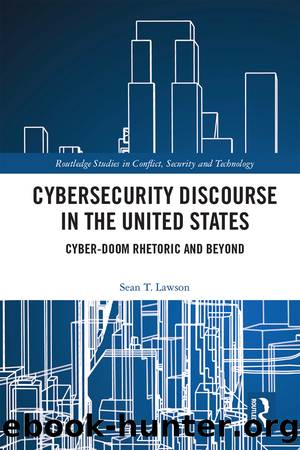Cybersecurity Discourse in the United States: Cyber-Doom Rhetoric and Beyond by Sean T. Lawson

Author:Sean T. Lawson [Lawson, Sean T.]
Language: eng
Format: epub
Tags: International Relations, Media & Internet, Political Science, Political Process, Political Freedom, General
ISBN: 9781315505596
Google: nfvADwAAQBAJ
Publisher: Routledge
Published: 2019-12-05T07:59:41+00:00
James Lewis (Lewis, 2006) of the Center for Strategic and International Studies has observed, âThe widespread blackout did not degrade U.S. military capabilities, did not damage the economy, and caused neither casualties nor terror.â
Despite the fact that historical and sociological evidence has shown that âpeople are irked but not terrified at the prospectâ of power loss (Nye, 2010: 191), and, therefore, that intentional attacks on the power grid are ânot likely to cause the same type of immediate fear and emotionâ as a conventional attack (Stohl, 2007), scenarios in which the loss of power leads to panic, chaos, and social collapse persist because of the persistence of a technological determinist mindset among officials, the media, and the general public. Nye has observed that most reports that are written about blackouts after the fact focus on technical reasons for failures and technical or bureaucratic changes to avoid such failures in the future. They âestablish many facts but provide little insight into the social meaning or the historical significance of blackoutsâ (Nye, 2010: 4). Not surprisingly, most of the policy response to the 2003 blackout focused on technical or regulatory changes (Minkel, 2008). What gets overlooked in these accounts and the types of policy responses they encourage is the human capacity for âadaptation and improvisation in the face of crisisâ (Nye, 2010: 195).
As mentioned earlier, some have argued that a so-called cyber 9/11 could approximate or even exceed the impacts of the terrorist attacks of September 11, 2001. Others, including the sponsors of cybersecurity legislation, as well as a former White House cybersecurity czar, have spoken of a possible âcyber Katrinaâ (Epstein, 2009). But, in both of those cases, people generally responded in the ways that they have in other disasters, without panic, paralysis, or social collapse. Disaster sociologist Lee Clarke has noted that on 9/11, âpeople did not become hysterical but instead created a successful evacuationâ (Clarke, 2002: 23). That evacuation of Lower Manhattan, which involved nearly half a million people, âwas a self-organized volunteer process that could probably never have been planned on a government officialâs clipboardâ (Glenn, 2005). At the level of the national economy, the Congressional Research Service concluded, âThe loss of lives and property on 9/11 was not large enough to have had a measurable effect on the productive capacity of the United Statesâ (Makinen, 2002). A 2010 report by the Center for Risk and Economic Analysis of Terrorism Events showed that the overall economic impacts of the 9/11 attacks were even lower than initially estimated, indicating that the U.S. economy is more resilient in the face of disaster and intentional attack than commonly assumed (NBC Los Angeles, 2010). At the geopolitical level, if the goal of the terrorists was to drive the United States from the Middle East, then the 9/11 attacks backfired. Just as World War II aerial bombardment often served to strengthen rather than weaken the will to resist among targeted populations, Freedman (2005: 169) has observed, âThe response [to 9/11] was not to
Download
This site does not store any files on its server. We only index and link to content provided by other sites. Please contact the content providers to delete copyright contents if any and email us, we'll remove relevant links or contents immediately.
The Secret History by Donna Tartt(19052)
The Social Justice Warrior Handbook by Lisa De Pasquale(12187)
Thirteen Reasons Why by Jay Asher(8893)
This Is How You Lose Her by Junot Diaz(6877)
Weapons of Math Destruction by Cathy O'Neil(6265)
Zero to One by Peter Thiel(5786)
Beartown by Fredrik Backman(5737)
The Myth of the Strong Leader by Archie Brown(5499)
The Fire Next Time by James Baldwin(5431)
How Democracies Die by Steven Levitsky & Daniel Ziblatt(5215)
Promise Me, Dad by Joe Biden(5141)
Stone's Rules by Roger Stone(5081)
A Higher Loyalty: Truth, Lies, and Leadership by James Comey(4954)
100 Deadly Skills by Clint Emerson(4921)
Rise and Kill First by Ronen Bergman(4779)
Secrecy World by Jake Bernstein(4741)
The David Icke Guide to the Global Conspiracy (and how to end it) by David Icke(4707)
The Farm by Tom Rob Smith(4502)
The Doomsday Machine by Daniel Ellsberg(4484)
